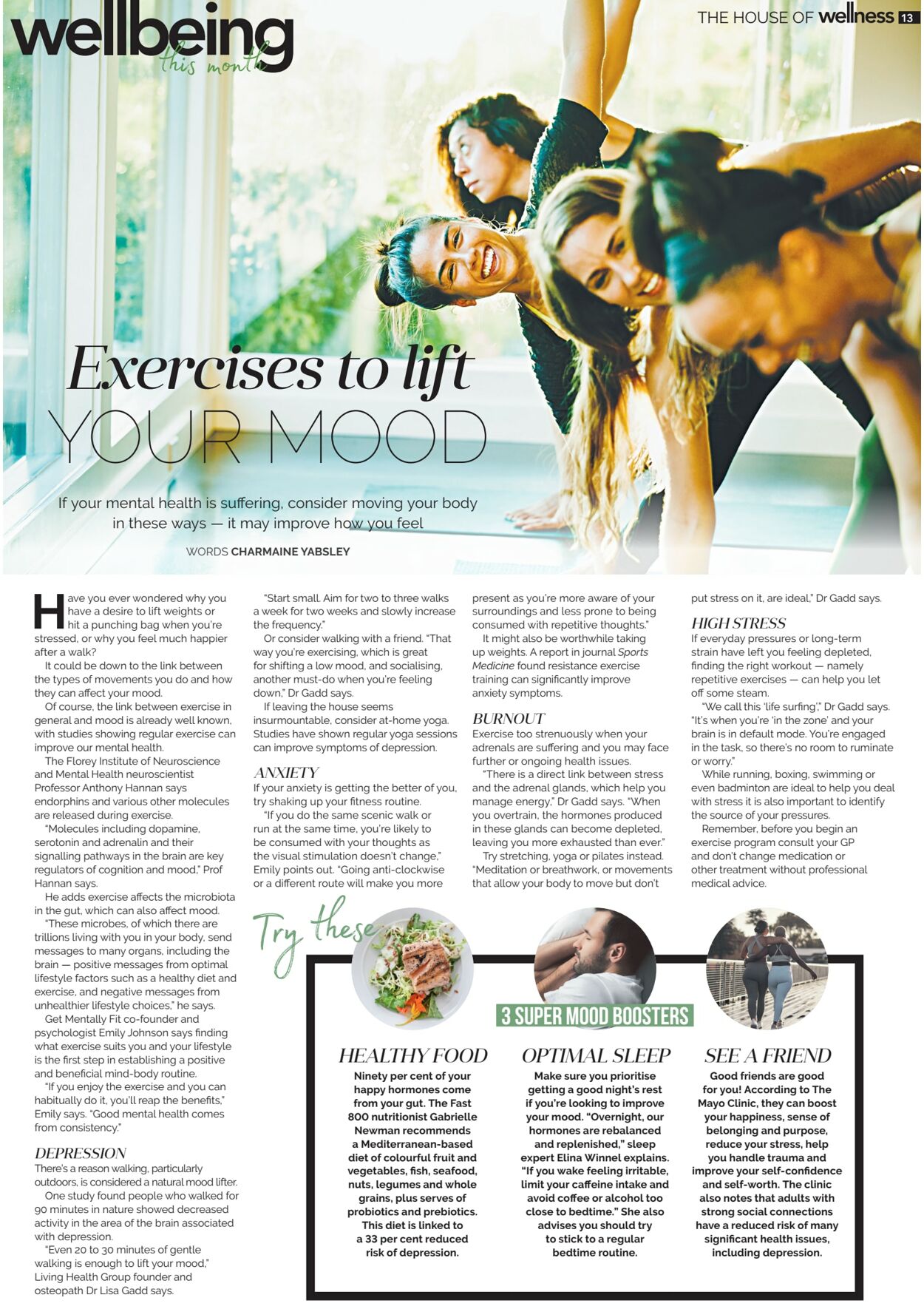













Products in this catalogue
If your mental health is suffering, consider moving your body in these ways — it may improve h el WORDS CHARMAINE YABSLEY ave you ever wondered why you IH] have a desire to lift weights or hit a punching bag when youre stressed, or why you feel much happier after a walk? It could be down to the link between the types of movements you do and how they can affect your mood. Of course, the link between exercise in general and mood is already well known. with studies showing regular exercise can improve our mental health. The Florey Institute of Neuroscience and Mental Health neuroscientist Professor Anthony Hannan says endorphins and various other molecules are released during exercise. “Molecules including dopamine. serotonin and adrenalin and their signalling pathways in the brain are key regulators of cognition and mood; Prof Hannan says He adds exercise affects the microbiota in the gut, which can also affect mood. “These microbes, of which there are trillions tiving with you in your body, send messages to many organs, including the brain — positive messages from optimal lifestyle factors such as a healthy diet and exercise, and negative messages from unhealthier lifestyle choices.” he says. Get Mentally Fit co-founder and psychologist Emily Johnson says finding what exercise suits you and your lifestyle is the first step in establishing a positive and beneficial mind-body routine. “If you enjoy the exercise and you can habitually do it, you'll reap the benefits” Emily says. “Good mental health comes from consistency” DEPRESSION There's a reason walking, particularly outdoors, is considered a natural mood lifter. (One study found people who walked for 90 minutes in nature showed decreased activity in the area of the brain associated with depression. “Even 20 to 30 minutes of gentle walking is enough to lift your mood” Living Health Group founder and osteopath Dr Lisa Gadd says. “Start small. Aim for two to three walks a week for two weeks and slowly increase the frequency’ Or consider walking with a friend. “That way youre exercising, which is great for shifting a low mood, and socialising another must-do when you're feeling down: Dr Gadd says. IF leaving the house seems insurmountable, consider at-home yoga. Studies have shown regular yoga sessions can improve symptoms of depression. ANXIETY If your anxiety is getting the better of you, try shaking up your fitness routine. “Ifyou do the same scenic walk or run at the same time, you're likely to be consumed with your thoughts as the visual stimulation doesn't change,” Emily points out. ‘Going anti-clockwise ora different route will make you more HEALTHY FOOD Ninety per cent of your happy hormones come from your gut. The Fast 800 nutritionist Gabrielle Newman recommends a Mediterranean-based diet of colourful fruit and vegetables, fish, seafood, nuts, legumes and whole grains, plus serves of probiotics and prebiotics. This diet is linked to a 33 per cent reduced risk of depression. present as you're more aware of your surroundings and less prone to being consumed with repetitive thoughts” It might also be worthwhile taking up weights. A report in journal Sports Medicine found resistance exercise training can significantly improve anxiety symptoms. BURNOUT Exercise too strenuously when your adrenals are suffering and you may face further or ongoing health issues. “There is a direct link between stress and the adrenal glands, which help you manage energy.” Dr Gadd says. ‘When you overtrain, the hormones produced in these glands can become depleted, leaving you more exhausted than ever.” Try stretching, yoga or pilates instead. "Meditation or breathwork, or movements that allow your body to move but don't OPTIMAL SLEE! Make sure you prioritise getting a good night's rest if you're looking to improve your mood. “Overnight, our hormones are rebalanced and replenished,” steep expert Elina Winnel explains. “If you wake feeling irritable, limit your caffeine intake and avoid coffee or alcohol too close to bedtime.” She also advises you should try to stick toa regular bedtime routine. THE HOUSE OF well : ' put stress on it, are ideal Dr Gadd says. HIGH STRESS If everyday pressures or long-term strain have left you feeling depleted finding the right workout — namely repetitive exercises — can help you let off some steam “We call this ‘life surfing’ Dr Gadd says. “it's when you're ‘in the zone’ and your brain is in default mode. You're engaged in the task, so there's no room to ruminate or worry” While running, boxing, swimming or even badminton are ideal to help you deal with stress it is also important to identify the source of your pressures Remember, before you begin an exercise program consult your GP and don't change medication or other treatment without professional medical advice. SEE A FRIEND Good friends are good for you! According to The Mayo Clinic, they can boost your happiness, sense of belonging and purpose, reduce your stress, help you handle trauma and improve your self-confidence and self-worth. The clinic also notes that adults with strong social connections have a reduced risk of many significant health issues, including depression.
| Name | Details |
|---|